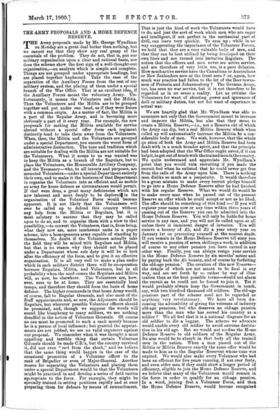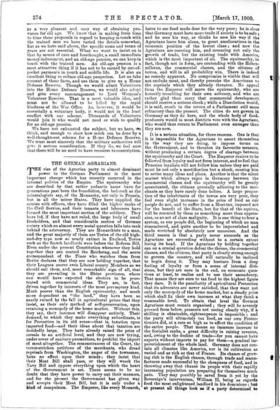THE ARMY PROPOSALS AND A HOME DEFENCE RESERVE. T HE Army
proposals made by Mr. George Wyndham on Monday are a great deal better than nothing, but we cannot say that they show any real grasp of the essentials of the problem. They do not, that is, put our military organisation upon a clear and rational basis, nor does the scheme show the first sign of a well-thought-out organisation,—an analysis which is simple and complete. Things are not grouped under appropriate headings, but are placed together haphazard. Take the case of the separation of the Auxiliary Forces from the rest of our military system, and the placing of them under a special branch of the War Office. That is an excellent idea, if the Auxiliary Forces meant the voluntary Army. Un- fortunately, it means the Volunteers and the Militia. Thus the Volunteers and the Militia are to be grouped together and put under one head, as if they were forces with a common origin. As a matter of fact, the Militia is a part of the Regular Army, and is becoming more obviously a part of it every year. For example, the new proposals for making the Militia available for service abroad without a special offer from each regiment distinctly tend to take them away from the Volunteers. When, then, the Militia and the Volunteers are grouped under a special Department, you ensure the worst form of administrative distraction. The tone and tradition which are suitable for dealing with the Militia are not suitable for the Volunteers. What it seems to us was wanted was to keep the Militia as a branch of the Regulars, but to place the Volunteers, the Honourable Artillery Company, and the Yeomanry—who, to all intents and purposes, are mounted Volunteers—under a special Department entirely their own, and to make it the business of that Department to organise the Volunteers into as efficient and as mobile an army for home defence as circumstances would permit. If that were done, a great many deficiencies which are now inherent and most deeply to be deplored in the organisation of the Volunteer Force would become apparent. It is not likely that the Volunteers will ever be called up to defend this country without any help from the Militia or Regulars, but it is most salutary to assume that they may be called upon to do so, and to organise them with a view to that possibility,—to convert the Volunteers, that is, from being, what they now are, mere incoherent units in a paper scheme, into a homogeneous army capable of standing by themselves. No doubt if the Volunteers actually take the field they will be mixed with Regulars and Militia, but that is no reason why they should not be placed under a Department whose sole duty it will be to look after the efficiency of the force, and to give it an effective organisation. It is all very well to make a plan under which in each military district there will be co-operation between Regulars. Militia, and Volunteers, but in all probability when the need conies the Regulars and Militia will, as now, be elsewhere. The Volunteers are, how- ever, sure to be at home. They are essentially local troops, and therefore they should form the basis of home defence. The higher commands in that home Army would, of course, fall to Regular Generals, and also most of the Staff appointments and, as now, the Adjutants should be Regulars, but wherever possible Volunteer officers should be promoted, and, though we suppose the words will sound like blasphemy to many soldiers, we see nothing dreadful in the notion of Volunteer Generals. Of course no one must be promoted to such a rank merely because he is a person of local influence ; but granted the appoint- ments are not jobbed, we see no valid argument against our proposal. We remember when it was thought a most appalling and terrible thing that certain Volunteer Colonels should be made C.B.'s, but the country survived it, did not even "reel from the shock," and we believe that the same thing would happen in the case of the occasional promotion of a Volunteer officer to the rank of Brigadier or even of Major-General. Another reason for separating the Volunteers and placing them under a special Department would be that the Volunteers might be practised in and develop a series of field tactics appropriate to the force. For example, they might be specially trained in seizing positions rapidly and at once preparing them for defence by means of entrenchment. That is just the kind of work the Volunteers would have to do, and just the sort of- work which men who are eager and intelligent, if not perfect in the mechanical part of drill, can learn very quickly. To sum up ; while in no way exaggerating the importance of the Volunteer Forces, we hold that they are a very valuable body of men, and that they can be best utilised by being developed on their own lines and not turned into imitation Regulars. The notion that the officers and men never see active service, and are therefore of very little use, is a pure delusion. How much active service have the Canadians or Australians or New Zealanders now at the front seen ? or, again, how much war practice had fallen to the lot of the Boer towns- men of Pretoria and Johannesburg ? The German Army, too, has seen no war service, but it is not therefore to be regarded as in no sense a reality. Let us criticise the Volunteers for want of shooting power and ignorance of drill or military duties, but not for want of experience in actual war.
We are heartily glad that Mr. Wyndham was able to announce not only that the Government meant to increase and improve the Militia, but also that they mean to create a Militia Reserve,—i.e., not a Reserve out of which the Army can dip, but a real Militia Reserve which when called up will automatically increase the Militia by a con- siderable body of men. We wish, however, that the whole qu stion of both the Army and Militia Reserve had been dealt with in a much broader spirit, and that the principle had been adopted that the War Office ought never, if it can hel pit, to get out of touch with the trained men in the country. We quite understand and appreciate Mr. Wyndham's point that you would ruin recruiting if you made the recruit feel when he enlisted that he could never get free from the calls of the Army upon him. There is nothing men dislike so much as a perpetuity. It would therefore be a great mistake to make every recruit pledge himself to go into a Home Defence Reserve after he had finished with his regular Reserve. What we would do would be to make every man when be passed out of the present Reserve an offer which he could accept or not as he liked. The offer should. be something of this kind :---` If you will register your name now or any time within three years of passing out of the Reserve you can be admitted into the Home Defence Reserve. You will only be liable for home service in any case, and you will not be called upon at all unless there is imminent danger of invasion. You will receive a bounty of £5, and £2 a year every year on January 1st on presenting yourself at the nearest depot: If you remain in the Home Defence Reserve till sixty you will receive a pension of seven shillings a week, in addition of course to any other pension you have earned in any other way. Finally, you can always resign your service in the Home Defence Reserve by six months' notice and by paying back the £5 bounty, and of course by forfeiting the old-age pension.' The creation of this new Reserve— the details of which are not meant to be final in any way, and are set forth by us rather • by way of illus- tration than as the best possible terms—would not alarm the recruit as he could not be forced to join it. Yet it would probably always keep the Government in touch, say, with two hundred thousand old soldiers. The old-age pensions part of the scheme need not be regarded as anything very revolutionary. We have all been dis- cussing the advisability of giving the veterans of industry old-age pensions, but who deserves an old-age pension more than the man who has served his country as a soldier ? We all feel that it is a national disgrace for an old soldier to die a beggar. The scheme we advocate would enable every old soldier to avoid extreme destitu- tion in his old age. But we would not confine the Heine Defence Reserve to old soldiers of the Regular Army. Its aim would be to absorb in that body all the trained men in the nation. When a man passed out of the Militia or Militia Reserve exactly the same offer would be made to him as to the Regular Reservist whose time was expired. We would also make every Volunteer, who had been an efficient for five years running, if not over forty, and even older men if they could show a longer period of efficiency, eligible to join the Home Defence Reserve, and we believe that many of the Volunteers would remain in the force. in order to qualify for an old-age pension. In a word, .joining first a Volunteer Force, and then the Home Defence Reserve, would become recognised as a very pleasant and easy way of obtaining pro- vision for old age. We know that in making from time to time these proposals in regard to keeping in touch with the trained men we have varied the details somewhat, but as we have said above, the specific sums and terms of years are not essential. What we want to insist on is that by means of care and forethought, a small immediate money inducement, and an old-age pension, we can keep in touch with the trained men. An old-age pension is a most attractive thing if it has not to be earned by out-of- pocket payments in youth and middle life. It is also an excellent thing to reduce old-age pauperism. Let us take account of these facts, and use them to give us a Home Defence Reserve. Though we would admit Volunteers into the Home Defence Reserve, we would also adopt and give every encouragement to Lord Wemyss's Volunteer Reserve. That is a most valuable idea, and mint not be allowed to be killed by the tepid kindness of the War Office. As, however, it would be essentially a voluntary body, it would not in the least conflict with our scheme. Thousands of Volunteers would join it who would not need or wish to qualify for an old-age pension.
We have not exhausted the subject, but we have, NPe thiuk, said enough to show how much can be done by a well-thought-out scheme for a Heme Defence Reserve. We trust most sincerely that the military authorities will give it serious consideration. If they do, we feel sure that there will be no need to have recourse to conscription.

































 Previous page
Previous page